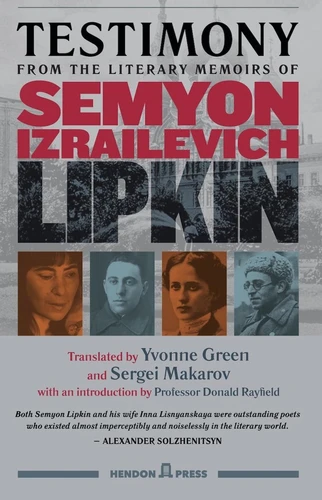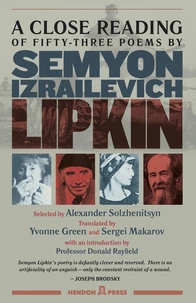Testimony from the Literary Memoirs of Semyon Izrailevich Lipkin
Par : ,Formats :
Disponible dans votre compte client Decitre ou Furet du Nord dès validation de votre commande. Le format ePub est :
- Compatible avec une lecture sur My Vivlio (smartphone, tablette, ordinateur)
- Compatible avec une lecture sur liseuses Vivlio
- Pour les liseuses autres que Vivlio, vous devez utiliser le logiciel Adobe Digital Edition. Non compatible avec la lecture sur les liseuses Kindle, Remarkable et Sony
 , qui est-ce ?
, qui est-ce ?Notre partenaire de plateforme de lecture numérique où vous retrouverez l'ensemble de vos ebooks gratuitement
Pour en savoir plus sur nos ebooks, consultez notre aide en ligne ici
- FormatePub
- ISBN978-1-7397785-4-5
- EAN9781739778545
- Date de parution28/03/2023
- Protection num.pas de protection
- Infos supplémentairesepub
- ÉditeurHendon Press
Résumé
The Jewish, Odesa-born poet, Semyon Izrailevich Lipkin (1911-2003), was a central figure in modern Russian literature, although until recently, he was best known in the West for his role in preserving the manuscript of Vasily Grossman's Life and Fate from the KGB. As a Soviet journalist in WW2, he witnessed and wrote about the horrors of Stalingrad, which led the Nobel Laureate Josef Brodsky to refer to him as 'Russia's war poet'.
Later, during the years of Stalin's deportation of ethnic groups, Lipkin translated and preserved the language and writings of Tajiks, Uzbeks, and Tatars and, in doing so, became a living repository of their culture for which he risked censure and arrest from the Soviet authorities. In this memoir, Lipkin's humanity, civic courage, and friendship with many important Russian writers - Anna Akhmatova, Marina Tsvetaeva, Andrei Platonov, and of course, Grossman himself - shine through the reports of terror and oppression that characterized this most turbulent period of Russian history.
Later, during the years of Stalin's deportation of ethnic groups, Lipkin translated and preserved the language and writings of Tajiks, Uzbeks, and Tatars and, in doing so, became a living repository of their culture for which he risked censure and arrest from the Soviet authorities. In this memoir, Lipkin's humanity, civic courage, and friendship with many important Russian writers - Anna Akhmatova, Marina Tsvetaeva, Andrei Platonov, and of course, Grossman himself - shine through the reports of terror and oppression that characterized this most turbulent period of Russian history.
The Jewish, Odesa-born poet, Semyon Izrailevich Lipkin (1911-2003), was a central figure in modern Russian literature, although until recently, he was best known in the West for his role in preserving the manuscript of Vasily Grossman's Life and Fate from the KGB. As a Soviet journalist in WW2, he witnessed and wrote about the horrors of Stalingrad, which led the Nobel Laureate Josef Brodsky to refer to him as 'Russia's war poet'.
Later, during the years of Stalin's deportation of ethnic groups, Lipkin translated and preserved the language and writings of Tajiks, Uzbeks, and Tatars and, in doing so, became a living repository of their culture for which he risked censure and arrest from the Soviet authorities. In this memoir, Lipkin's humanity, civic courage, and friendship with many important Russian writers - Anna Akhmatova, Marina Tsvetaeva, Andrei Platonov, and of course, Grossman himself - shine through the reports of terror and oppression that characterized this most turbulent period of Russian history.
Later, during the years of Stalin's deportation of ethnic groups, Lipkin translated and preserved the language and writings of Tajiks, Uzbeks, and Tatars and, in doing so, became a living repository of their culture for which he risked censure and arrest from the Soviet authorities. In this memoir, Lipkin's humanity, civic courage, and friendship with many important Russian writers - Anna Akhmatova, Marina Tsvetaeva, Andrei Platonov, and of course, Grossman himself - shine through the reports of terror and oppression that characterized this most turbulent period of Russian history.




